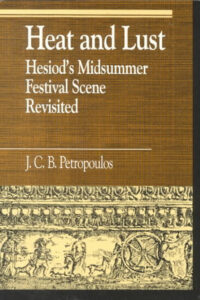We are pleased to announce the online publication of Heat and Lust: Hesiod’s Midsummer Festival Scene Revisited, by J. C. B. Petropoulos, for free on the CHS website.
 Professor Gregory Nagy, General Editor, shares in the book’s foreword:
Professor Gregory Nagy, General Editor, shares in the book’s foreword:
Heat and Lust: Hesiod’s Midsummer Festival Scene Revisited, by John Petropoulos, is an extraordinarily perceptive work of scholarship. This book compares the description of a festival in Hesiod’s Works and Days with the traditions of songs that were actually sung at such festivals, ranging from a drinking song of Alcaeus all the way to the folksong traditions of latter-day Greece. No one before Petropoulos has ever noticed the interconnectedness of all these traditions. Thanks to the author’s patient piecing-together of the facts, what may seem at first merely a collection of drab separate details becomes transformed into a unified picture of breathtaking intensity, with a vibrant beauty of its own.
What Petropoulos has uncovered is a living tradition in all its continuities and discontinuities, extending from Hesiod to the present. It is a tradition of songmaking that centers on the potentially comic theme of male impotence and female hypersexuality at the climactic seasonal moment of harvesttime, during the Dog Days of summer, when the scorching heat of Sirius the Dog Star dries out the fluids of men and fires up the humors of women, at the very moment that the thistle-plant goes into bloom and the cicada pours forth his song—to conjure up some of the central images of this lively song tradition. As Hesiod says, this is a good time to be drinking and making merry. And all the merriment can be realized in song—a song about men and women, heat and lust. With its festive sensibilities, the song infuses even the otherwise somber didactic words of Hesiod with a burst of merriment.
The Heldentenor, as it were, of this comic opera is none other than that disreputable singer of songs himself, the Cicada, commonly mistranslated for our times as the Grasshopper in the Aesop fable of the Ant and the Grasshopper. The Greek story of the Ant and the Cicada, which became one of the best-known fables of Aesop, was also a central underlying theme of the harvest songs that Petropoulos traces from Hesiod to the present. And the role of its protagonist, that irresponsible singer of songs, is woven into the very fabric of the Hesiodic Works and Days.
Continue reading online!
